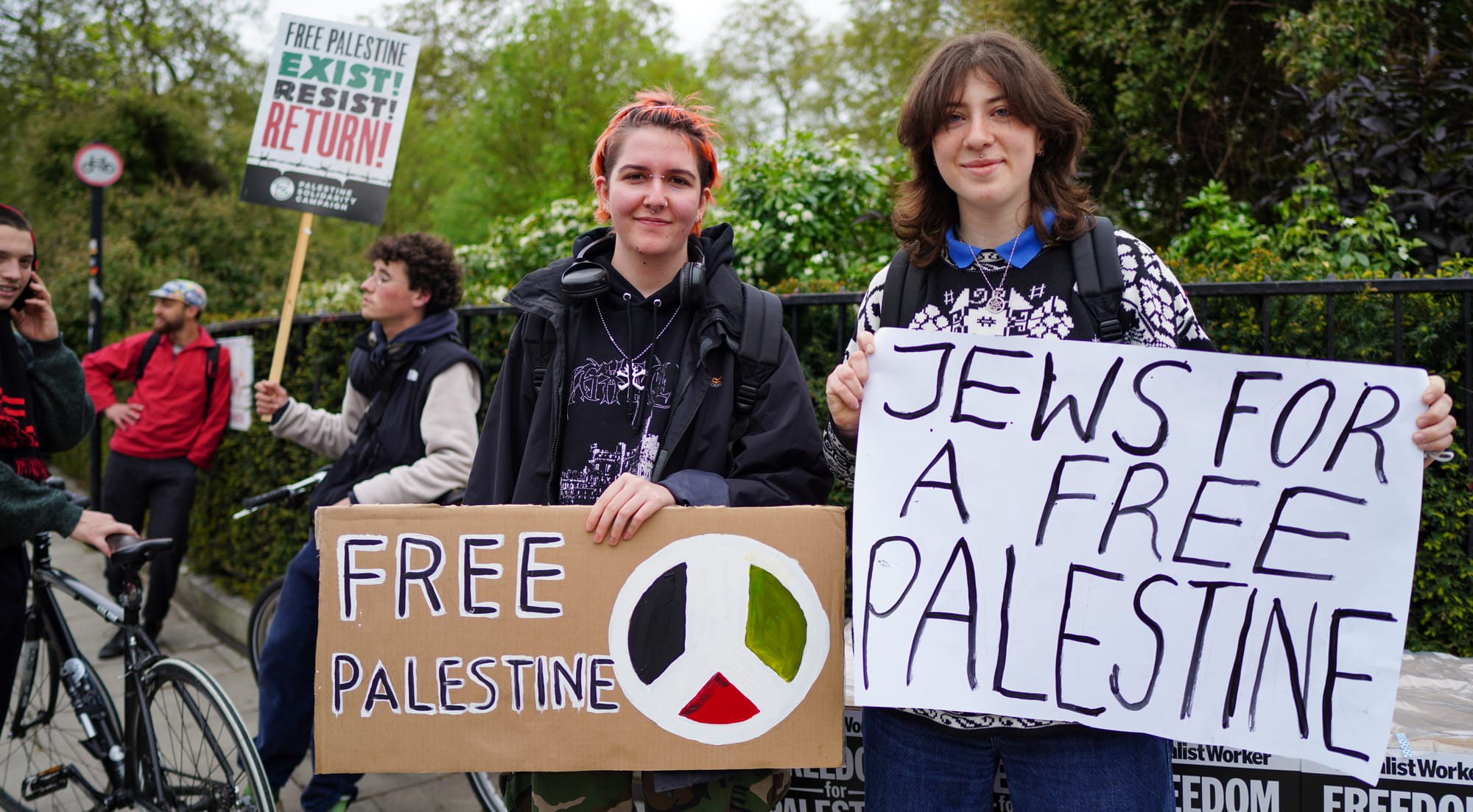
The decision to prosecute Marieha Hussain, who attended a march against the genocide in Gaza with a sign depicting Rishi Sunak and Suella Braverman as coconuts, has become emblematic of the double standards used to police the way different marginalised communities criticise public figures of the same race or ethnicity.
Hussain’s sign sparked a fierce debate about the use of the term “coconut”, with some suggesting it was a racial slur. However, as she told Al Jazeera, “Each culture has their own language used to hold to account people of ethnic origins who use their positions of power to push white supremacy ideals, narratives and policies.”
Jews, in theory, have a word for this too: “kapo” – the name that the Nazis gave to certain prisoners in concentration camps who were invested with some power over other inmates, and a minority of whom were Jewish. I have rarely heard the term used by anti-racist Jews or in opposition to white supremacy. Instead, it is generally wielded against Jews who are seen as insufficiently supportive of Israel.
Tasked with forcing starving people to work, some kapos were known for their cruelty and violence towards fellow prisoners. The Jewish ones were often regarded as traitors, abusing fellow Jews to get better sleeping quarters and increased food rations, though some used their positions of relative power to help other inmates.
In the postwar period, Jewish kapos were widely reviled. Some were beaten to death by fellow prisoners when the camps were liberated, while Israeli, Polish and East and West German authorities prosecuted others for their complicity in Nazi war crimes. While scholarly opinion has moved on from this moral equivalence between Jewish kapos and Nazis – kapos did not choose their circumstances, unlike the SS officers who gave them marching orders – Jewish revulsion towards those perceived as traitors has remained in many quarters, eventually birthing what the Jewish Chronicle has called “the worst insult a Jew can give another Jew”.
The dark history behind the term means it is never used playfully, as “coconut” and similar terms sometimes are. I have heard the latter used more often to describe people of colour with a white-seeming taste in food or music than directed towards those, like Sunak and Braverman, who align themselves with white supremacy through their support for genocide and demonisation of migrants and asylum seekers.
The use of “kapo,” by contrast, has a clear implication: the person being described is morally equivalent to a Nazi. Even so, it is used very liberally by rightwing Jews and philosemites online, for example to describe Bernie Sanders after he said that Benjamin Netanyahu shouldn’t be invited to address Congress, or to describe an Israeli journalist who tried protect his Palestinian colleague from being attacked by a mob of Jewish settlers at this week’s flag march in Jerusalem.
Increasing use of “kapo” in this way has had the effect of inviting non-Jews, often who self-identify as allies to the Jewish community, to participate in the ostracism of leftwing and anti-Zionist Jews, with seemingly little pushback from the Jewish establishment.
The non-Jewish comedian Daniel Ryan Spaulding, for example – who has gone viral for cringe-inducing videos that launder his Zionist beliefs through philosemitism, pinkwashing, homonationalism, misogyny, transphobia and dizzying camera angles – recently used the term to smear anti-Zionist Jews during a comedy set in Tel Aviv. This use is straightforwardly antisemitic, but rarely discussed as such by anyone except the anti-Zionist Jews under attack.
Meanwhile, mainstream non-Jewish politicians may refrain from using the word “kapo”, but they are increasingly comfortable expressing similar sentiments. This week, a video resurfaced of Luke Akehurst, an Israel lobbyist and member of the Labour party’s national executive committee who is standing as a parliamentary candidate, accusing anti-Zionist Jews of having “abandoned very much of their Jewish identity”.
I had assumed that the term “kapo” had a similar history to how “coconut” is used in communities of colour: as a way of calling out our communal establishment’s alignment with white supremacy. But to my surprise, the earliest example I could find of the term being used as an insult was from 2009 – and it was around this time that it started being popularised by the right-wing Jewish-American pundit Ben Shapiro.
In a 2010 letter calling on American Jews to end their support for the Democratic Party over Obama’s (fairly limited) sympathy for Palestine, Shapiro used the word “kapo” to smear then-Obama advisor Rahm Emanuel. That same year, Shapiro used it again to describe the liberal Jewish philanthropist George Soros, whose Open Society Foundation provides funding for a wide range of liberal and leftwing organisations (and who actually survived the Nazi occupation of Hungary).
Shapiro, who has worked to spread conspiracy theories about Soros, been named in court for radicalising a neo-Nazi who vandalised a synagogue, and defended Elon Musk from accusations of antisemitism, is about as close to a neo-Nazi as any Jew could be, but I still see no benefit in calling him a kapo. Using that term reinforces the misplaced notion that kapos were mostly Jewish, and generally traitors who willfully inflicted harm on members of their own communities.
The term’s origins on the political right offer some explanation as to why – unlike with “coconut” – the state has not intervened to prosecute the labelling of Jews as “kapos” as a hate crime, while it has used the law as a cudgel to persecute Black and Asian people who use “coconut” to critique internalised white supremacy.
In 2010, Shirley Brown, a Black Liberal Democrat councillor from Bristol, was convicted of a hate crime for calling Jay Jethwa, an Asian Conservative council colleague, a “coconut”. Brown was using the term in much the same way as Hussain, angered by Jetwa’s attempts to cut funds to an organisation that commemorates and attempts to make restitution for the ways in which Bristol profited from the transatlantic slave trade.
In this case, as in Hussain’s, the state attempted to rob “coconut” of its power to call out white supremacy among people of colour in positions of power, instead labelling as racists Black and Asian people who criticise members of their own communities for upholding the status quo.
Prosecuting people who use the word “kapo” would not perform the same function, because the use of “kapo” by Jewish establishment figures, and their far-right allies, already upholds white supremacy: it pushes liberatory politics out of Jewish communities and public discussions of antisemitism, even while the term implies the opposite power dynamic.
Discussion of the harmful power of this slur might seem academic. But when, as at a recent Zionist counterprotest in East Finchley, it is being yelled by far-right infiltrators – who also called some pro-Palestine protesters the P-word – it is much easier to picture its progenitors as SS officers than victims of the Holocaust.
Sasha Baker is an investigative journalist and podcast producer, and an editor at Vashti
There’s no corporation or big advertisers behind Vashti – we're a workers' cooperative and rely on small donations to keep running. Support our journalism to help break the consensus.
To donate once, click here. To donate monthly, click here.
Author

Sasha Baker is an investigative journalist.
Sign up for The Pickle and New, From Vashti.
Stay up to date with Vashti.



